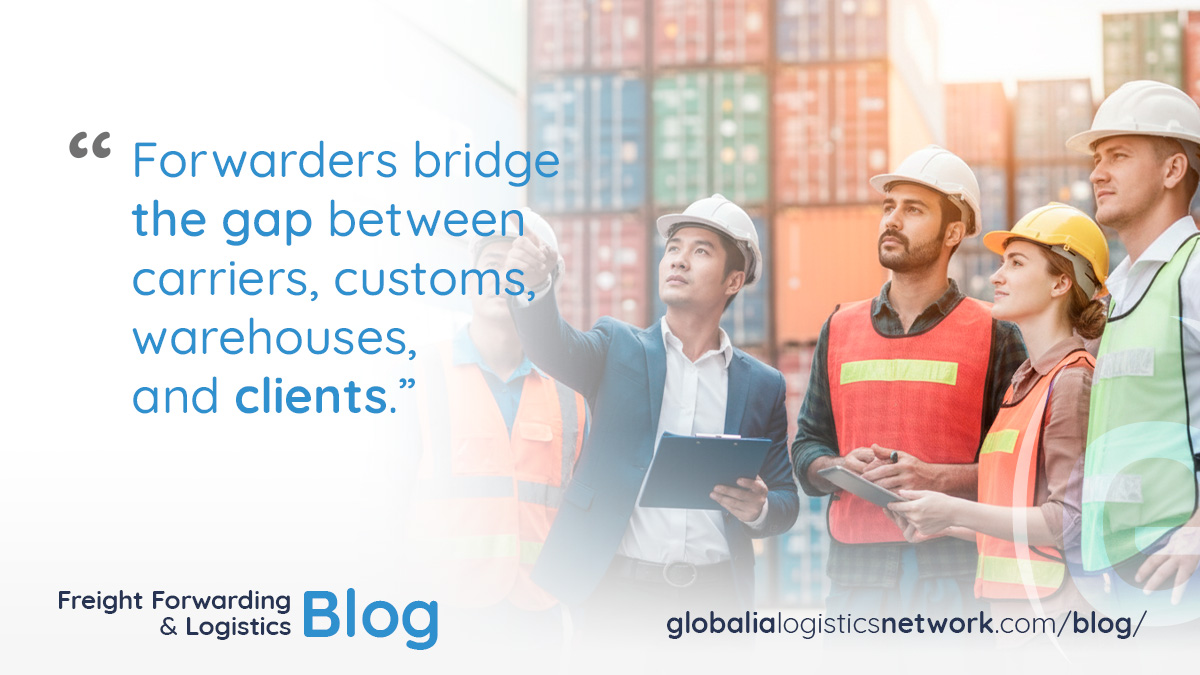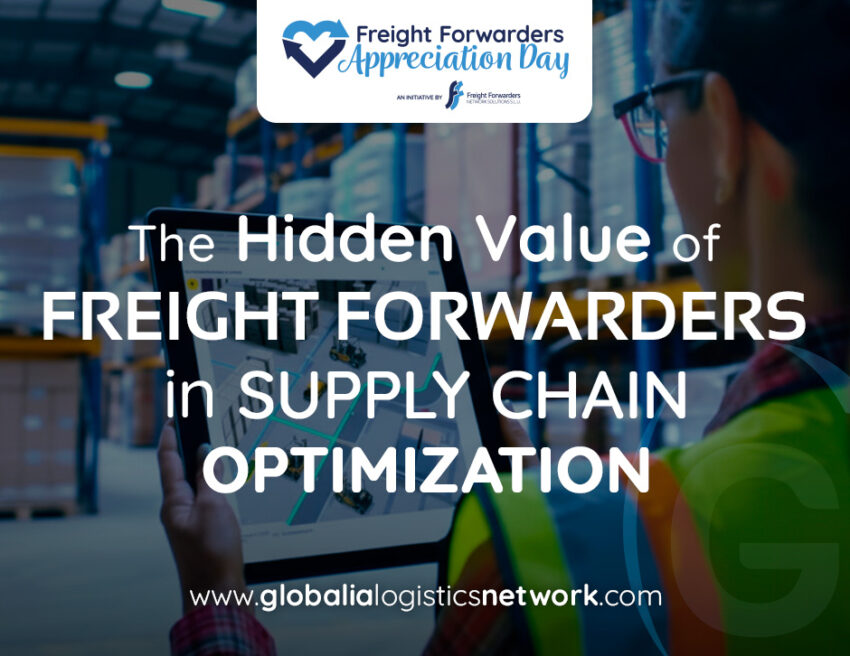This November 14th, Globalia Logistics Network will celebrate Freight Forwarders Appreciation Day, a day created to honour the professionals who quietly power global trade. The date marks the birthday of Malcom McLean, the visionary who introduced containerization and revolutionized how the world moves goods. His innovation sparked the modern logistics industry and today, freight forwarders carry that legacy forward with every shipment they handle.
At Globalia, we believe there’s no better moment to highlight the hidden value of freight forwarders. They are strategic freight partners who drive supply chain optimization, enhance reliability, and lower costs for businesses worldwide. While technology and automation often take the spotlight, the human expertise, adaptability, and network reach of freight forwarders remain the cornerstone of global logistics success. Let’s explore how forwarders deliver value that often goes unnoticed but never unfelt.

The Overlooked Role of Freight Forwarders in Supply Chain Optimization
When people think about supply chain optimization, they often picture software, analytics, and automation. But the real optimization happens through experience, relationships, and decision-making qualities that freight forwarders excel at. Forwarders bridge the gap between carriers, customs, warehouses, and clients. They synchronize dozens of moving parts across time zones and regulations to create seamless end-to-end movement of goods. This coordination directly boosts supply chain efficiency, minimizing delays, reducing storage costs, and improving delivery reliability.
A skilled forwarder does far more than just book cargo space; they continuously look for smarter, faster, and more cost-effective routes. They anticipate risks, navigate customs complexities, and balance freight modes to maintain stability in volatile markets. In short, they are supply chain architects who keep everything running smoothly behind the scenes.
How Freight Forwarders Optimize Supply Chains
To understand how freight forwarders optimize supply chains, it helps to look at what they do daily:
-
Route Optimization and Cost Analysis
Freight forwarders constantly analyze route options, carrier performance, and fuel costs to deliver the most efficient solutions. Their deep knowledge of market trends allows them to identify opportunities for logistics cost reduction while maintaining service reliability. -
Multimodal Transport Integration
Combining sea, air, rail, and road freight effectively is an art. Forwarders ensure that transitions between modes are smooth, cutting down on transit times and unnecessary handling. -
Customs Compliance and Documentation
Forwarders handle the maze of international trade paperwork and customs regulations, reducing the risk of penalties, delays, or confiscated cargo, one of the biggest threats to supply chain efficiency. -
Proactive Risk Management
From geopolitical disruptions to port congestion, forwarders anticipate potential problems and adjust quickly. Their local connections and industry insight make them invaluable in managing uncertainty. -
Technology-Driven Transparency
Through real-time tracking, digital documentation, and predictive analytics, forwarders now provide clients with visibility that enables better forecasting and planning.
By combining human expertise with digital innovation, freight forwarders deliver both agility and assurance, two essentials for modern supply chain optimization.
The Hidden Benefits of Using a Freight Forwarder
Many businesses underestimate the hidden benefits of using a freight forwarder until they face a logistical challenge. A good forwarder acts as a single point of contact, managing carriers, customs, storage, and delivery so the client can focus on their core business.
Here are some often-overlooked advantages:
-
Time Savings: Managing shipments internally takes enormous time and effort. Forwarders handle everything from booking to customs clearance, freeing up internal teams.
-
Buying Power: Established forwarders negotiate better rates with carriers due to their volume and industry relationships, contributing directly to logistics cost reduction.
-
Local Expertise: Global shipments depend heavily on understanding local rules and infrastructures. Forwarders provide this on-the-ground knowledge that in-house teams often lack.
-
Scalability: Whether it’s seasonal demand or unexpected surges, forwarders offer flexible capacity that can scale quickly without major investments.
-
Strategic Advice: The best forwarders serve as consultants, advising clients on regulations, packaging, trade lanes, and sustainability.
It’s no surprise that businesses that partner with reliable forwarders report smoother operations, fewer delays, and stronger relationships with their own clients.
Freight Forwarder vs In-House Logistics: Finding the Right Balance
Many companies debate freight forwarder vs in-house logistics when planning their operations. On paper, managing logistics internally may seem cost-effective. In reality, it often leads to hidden inefficiencies and missed opportunities. In-house teams lack the carrier network, market insight, and global presence that experienced forwarders offer. When disruptions hit, whether due to strikes, weather, or political shifts, freight forwarders already have the connections and contingency plans to pivot instantly.
By outsourcing to a strategic freight partner, companies not only reduce overhead but also gain access to global expertise without the burden of maintaining their own logistics departments in multiple countries. The result? More agility, lower costs, and greater focus on core business goals.
The Strategic Value of Freight Forwarders
In today’s competitive environment, the strategic value of freight forwarders goes far beyond shipment handling. They act as partners in planning, efficiency, and long-term growth.
Here’s what that means in practice:
-
Data-Driven Decisions: Many forwarders now use analytics to identify trends in freight costs, optimize inventory locations, and improve turnaround times.
-
Sustainability and Green Logistics: Forwarders help companies design eco-friendly transport plans that balance cost with carbon efficiency, a growing priority in global trade.
-
Crisis Resilience: Whether it’s a port closure or a global pandemic, forwarders know how to reroute and recover. Their agility ensures that supply chain optimization isn’t disrupted by external shocks.
This combination of adaptability and insight is what makes forwarders indispensable. They are not just operational partners, they’re strategic enablers of growth and competitiveness.
Value-Added Services of Freight Forwarders
Beyond transport coordination, forwarders provide a wide range of value-added services that enhance supply chain efficiency.
-
Warehousing and Distribution: Many forwarders offer storage, consolidation, and last-mile delivery solutions.
-
Cargo Insurance and Claims Support: They manage the financial risk of shipping, ensuring that clients are covered against loss or damage.
-
Documentation and Regulatory Support: From letters of credit to certificates of origin, forwarders simplify trade compliance.
-
Performance Reporting: Data analytics help businesses track costs, performance, and delivery accuracy over time.
Each of these services adds layers of reliability and value that contribute directly to smoother operations and happier customers.
Why Companies Need Freight Forwarders
With supply chains spanning continents and involving multiple stakeholders, the answer to why companies need freight forwarders is simple: expertise, reliability, and peace of mind. Forwarders bring coordination and control to an increasingly unpredictable global trade environment. They combine technical know-how, negotiation skills, and local insights to keep shipments moving efficiently even when circumstances change overnight.
For companies competing in tight-margin markets, this kind of strategic support is essential. That’s why networks like Globalia Logistics Network play such an important role. By uniting vetted freight forwarders in over 190 cities worldwide, Globalia ensures its members can collaborate seamlessly, share resources, and deliver global reach with local precision. Each member becomes a strategic freight partner not just to clients, but to one another.
The Future of Supply Chain Optimization
As global logistics grows more digital and interconnected, the future will reward companies that understand the true value of partnerships. Technology alone can’t solve every challenge, human expertise, trust, and cooperation remain the heart of supply chain optimization. Globalia Logistics Network continues to empower its members to deliver smarter, faster, and more resilient logistics solutions through collaboration. By combining innovation with partnership, forwarders ensure that the supply chains of tomorrow are not just efficient, but adaptable and future-ready.
So, as we celebrate Freight Forwarders Appreciation Day, let’s remember that the real strength of global trade lies not only in ships and software, but in the people and partnerships that keep the world connected.


